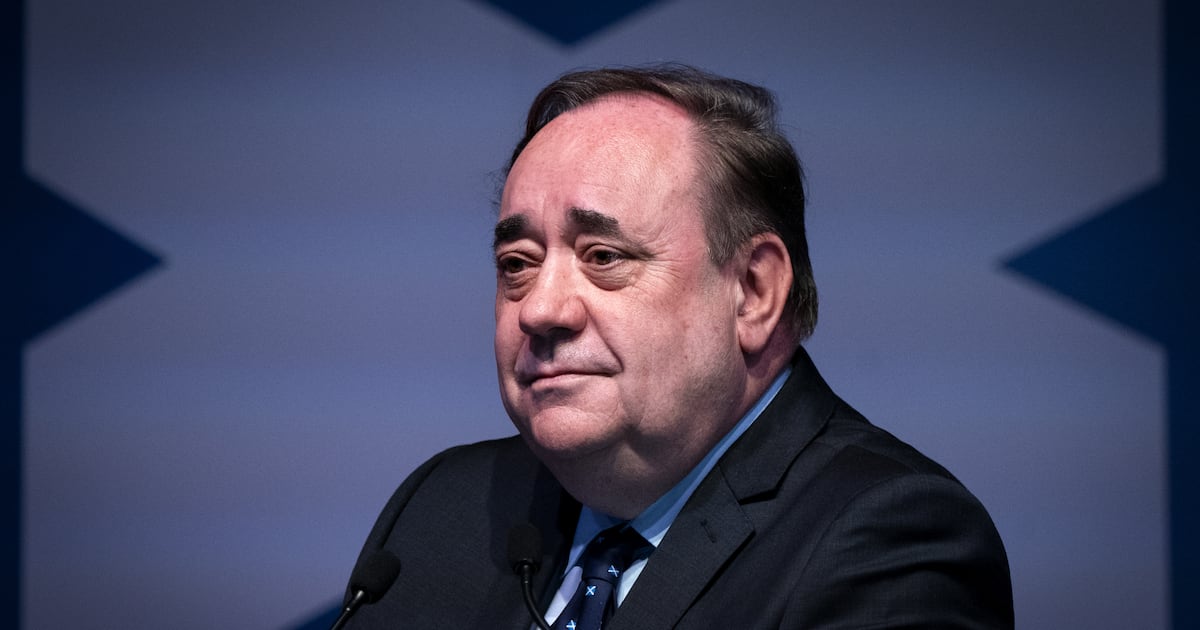Born December 31st, 1954
Died October 12th, 2024
The Scottish politician Alex Salmond, who has died suddenly at the age of 69, was a commanding figure who came close to breaking up the United Kingdom in the 55.3 to 44.7 per cent independence referendum of 2014.
The decision by David Cameron to grant the powers to hold a referendum on Scottish independence marked the apex of Salmond’s formidable career and reflected his achievement in leading the Scottish National Party to power at Holyrood.
It was a paradox of his career that he was better suited to the cut and thrust of Westminster debate than the more constrained environment of Holyrood. He was an orator and debater who flourished on the bigger stage.
After Salmond lost his Westminster seat in 2017, a nightmarish sequence of events dominated his life and placed enormous strains upon him. These centred around allegations from within the SNP and Scottish government of inappropriate sexual conduct in earlier years.
Salmond was eventually cleared on all charges, but much of the damage to his reputation had been done. The provenance of these allegations remains bitterly contested, and at the time of his death Salmond was pursuing through the courts an action for damages against the Scottish government and named individuals, including his successor, Nicola Sturgeon. Recently, the former Scottish minister and scion of an SNP dynasty, Fergus Ewing, described the pursuit of Salmond as “the scandal of our age”.
Alex Salmond was born in Linlithgow, West Lothian, the son of Mary (née Milne) and Robert Salmond, both civil servants.
He became a leading light in student debating at St Andrew’s University and president of the Federation of Student Nationalists. He graduated in 1978 with honours in economics. His first job was as an agricultural economist in the former Scottish Office. However, he was quickly involved in political activism as the SNP hit the rocks in the 1979 general election, after voting with Margaret Thatcher to bring down the Labour government. Salmond joined with others on the left of the party to form the 79 Group, which demanded a radical agenda directed at working-class voters.
This led to internal strife and Salmond – from 1980 employed by the Royal Bank of Scotland – was briefly expelled in 1982. However, the episode proved cathartic for the SNP and it emerged stronger.
In 1985, Salmond became its vice-convener with responsibility for publicity. In Scotland, the general election of two years later was dominated by the poll tax, and three seats won by the SNP included Banff and Buchan, where Salmond defeated the incumbent Tory, Albert McQuarrie. He also became deputy leader of the party.
His election as leader of the SNP in 1990 created the platform for greater prominence and internal modernisation.
The belief that Holyrood in opposition did not greatly appeal to Salmond was reinforced when he resigned as SNP leader in 2000, but remained at Westminster. John Swinney succeeded him as leader and was not a success. When Swinney resigned in 2004, Salmond made a last-minute decision to enter the contest that Sturgeon was otherwise likely to have won. Instead, she settled for becoming Salmond’s deputy.
In 2007, Salmond led the SNP to becoming the biggest party by a single seat. By now a skilled dealmaker, he persuaded the Scottish Tories to provide him with the majority needed to form a government. In office, the SNP provided stable government with Salmond dominant. He was a man of ideas, an effective communicator and had built a good relationship with Scottish business.
By 2011, with Labour still in disarray, Salmond achieved what the electoral system was not designed to deliver – a single-party overall majority at Holyrood with the SNP taking 69 of the 129 seats. It was the commanding nature of this result that persuaded Cameron he had no alternative to granting Salmond a referendum.
The protracted campaign for the 2014 referendum saw a substantial increase in support for independence, and in its latter stages opinion polls suggested that the “yes” side was edging ahead. However, the weakness of its case lay in the economic argument.
In the immediate aftermath of the referendum, Salmond announced his decision to resign both as first minister and leader of the SNP. It was a decision he would soon deeply regret. His protege and deputy, Sturgeon, succeeded him on the crest of a nationalist wave as the 45 per cent that had voted for independence largely held together.
Following the 2015 general election, Salmond returned to his old stamping ground of Westminster as MP for Gordon but found himself as one of 50 SNP MPs and in a relatively obscure role. In the 2017 election, he lost his seat to the biggest Tory swing in the UK. Reduced to the fringes of both Scottish and UK politics, he took on an ill-advised role as presenter of a weekly programme on the TV channel Russia Today.
Scotland was astounded by the turn in events of January 2019 when police charged Salmond with 14 offences, of which one was ultimately withdrawn. Salmond always maintained his innocence, and this was eventually sustained in the high court in Edinburgh in March 2020 on all charges, but the bitterness created, and the questions surrounding the legal process pursued by the Scottish government, have never abated.
Salmond was, by any standard, a significant figure in Scottish and UK politics over several decades. He attracted strong loyalties and deep hostility. But to very many Scots, he was a clever and committed politician with exceptional skills. He met Moira McGlashan when they were both Scottish Office civil servants, and they married in 1981. She survives him.
